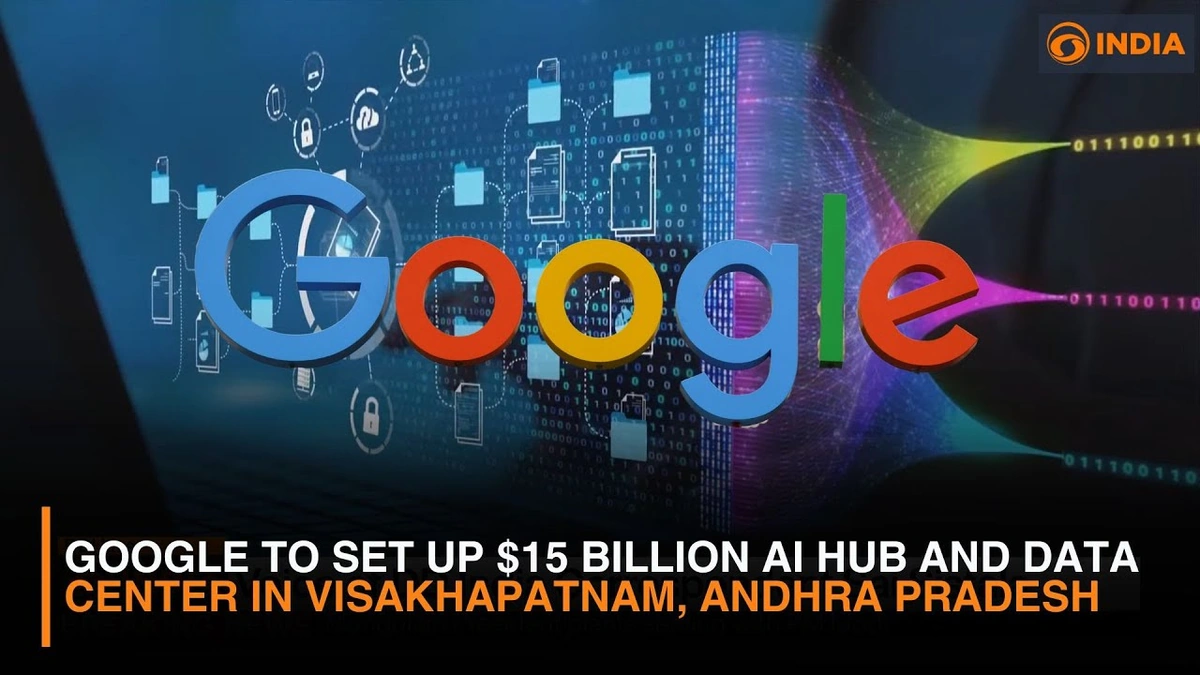The air crackled with anticipation. Not just because another tech hub was opening its doors, but because this one – Google’s AI hub in Visakhapatnam – carries the weight of a nation’s aspiration: AI for all. But what does that really mean for you, the average Indian? Let’s be honest, grand pronouncements often fall flat. So, let’s dive deeper than the headlines and see what this launch actually signals.
The “Why” | Decoding India’s AI Ambition

Forget the press releases for a moment. Why Visakhapatnam? Why now? India isn’t just chasing the AI wave; it’s strategically positioning itself. Vizag, with its existing tech infrastructure and talent pool, provides a fertile ground. But it’s more than just geography. The government’s push for digital literacy and AI education initiatives is creating a demand – and Google is stepping in to help supply. The NITI Aayog’s national strategy for AI emphasizes inclusive growth. This hub isn’t just about coding; it’s about creating AI solutions relevant to India’s unique challenges – agriculture, healthcare, education. Artificial intelligence holds immense potential for India’s growth. I initially thought this was just another corporate move, but then I realized it’s part of a much larger, coordinated strategy. The launch of the Google AI Hub Visakhapatnam signifies a commitment to making AI accessible and beneficial to all Indians, not just a select few.
The “How” | Skills, Jobs, and the AI Opportunity
Okay, so there’s a hub. Big deal, right? But here’s the practical side: how does this impact your career prospects? The Google AI hub in Andhra Pradesh promises to be a breeding ground for talent. Expect training programs, workshops, and collaborations with local universities. A common mistake I see people make is thinking AI is just for coders. It’s not! Data analysts, domain experts (in fields like healthcare or agriculture), and even marketers with an understanding of AI are in high demand. Think about upskilling. Online courses, certifications – they’re not just resume fillers anymore. They’re your ticket to riding the AI wave. And let’s not forget the entrepreneurial angle. This hub could very well be the launchpad for the next generation of Indian AI startups. But, success will depend on the available AI talent pool. The launch also emphasized the use of local languages in AI development. What fascinates me is the potential of these startups to develop solutions for real-world problems.
Navigating the AI Landscape | Challenges and Opportunities
It’s not all sunshine and roses. The AI revolution comes with its own set of challenges. Data privacy, ethical considerations, and the potential displacement of jobs are real concerns. According to experts, India must prioritize ethical AI development. A significant portion of India’s workforce needs to upskill to be ready for the AI revolution. The digital divide, especially in rural areas, needs to be addressed to ensure truly inclusive growth. What I initially thought was a straightforward initiative actually encompasses a whole gamut of socio-economic factors. Sleeper Down and the Google AI Hub Visakhapatnam are both related to technology.
The Future of AI in India | A Vision for Tomorrow
Let’s rephrase that for clarity: Where do we go from here? The success of the Google AI hub hinges on collaboration – between government, industry, and academia. The focus needs to shift from just developing AI to deploying it in a way that benefits the masses. Imagine AI-powered healthcare solutions reaching remote villages, personalized education making learning more effective, and smart agriculture boosting farmers’ yields. That’s the promise of AI for all. But, it requires a concerted effort to bridge the digital divide, address ethical concerns, and ensure that AI empowers, rather than displaces. The Google AI Hub Visakhapatnam can be a catalyst. But the rest is up to us.
And, now, it’s time to look at the potential challenges in AI adaptation in India.
Leveraging AI for Societal Impact | The Indian Context
Here’s the thing: AI isn’t just about algorithms and code. It’s about solving real-world problems. Think about using AI to predict crop yields and help farmers make informed decisions. Or using it to diagnose diseases earlier and provide better healthcare in underserved communities. What fascinates me is the potential to use AI to improve the lives of millions of Indians. The role of AI in healthcare , agriculture, and education is immense. But, it requires a deep understanding of the local context. The solutions need to be tailored to the specific needs and challenges of India. A common mistake I see people make is trying to apply western solutions without adapting them to the Indian context. The AI ecosystem in India is rapidly evolving, but still needs some major players. The launch of the Google AI Hub Visakhapatnam is a step in the right direction, but it’s just the beginning. Let’s explore how Airpods H Chip relates to the discussion of AI growth.
FAQ Section
Frequently Asked Questions
What is the main goal of the Google AI Hub in Visakhapatnam?
The hub aims to democratize AI, making it accessible and beneficial for all Indians.
How can I get involved with the Google AI Hub?
Look out for training programs, workshops, and collaborations with local universities.
What kind of jobs will the AI hub create?
Opportunities will arise for coders, data analysts, domain experts, and entrepreneurs.
What are the ethical considerations of AI development?
Data privacy, bias in algorithms, and potential job displacement are important issues.
How can AI help address India’s challenges?
AI can improve healthcare, agriculture, education, and various other sectors.
So, the next time you hear about AI, don’t just think about robots and sci-fi movies. Think about the farmer using AI to optimize his crops, the doctor diagnosing diseases earlier, and the student learning in a personalized way. That’s the real promise of AI for all – a promise that the Google AI Hub Visakhapatnam is helping to realize. Let’s look at google ai and data science for the future.




